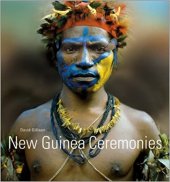New Guinea Ceremonies
| jazyk | anglicky | ||||
|---|---|---|---|---|---|
| rok vydání | 2002 | ||||
Zobrazit více
|
|||||
Prodám tuto knihu
Tuto knihu nabízí
Nabízení knih k prodeji je dostupné pouze registrovaným uživatelům s ověřeným číslem mobilního telefonu. Zaregistrovat
Prodávající
Lokalita
Foto
Cena
Sháním tuto knihu
Knihu zatím nikdo neshání
Sháním tuto knihu
Jakmile knihu někdo nabídne, dáme vám vědět.
(reklama)
Recenze
Přidejte svou recenzi a pomozte dalším čtenářům
Pro přidávání komentářů se prosím přihlašte.
Nahlásit chybu u této knihy
Antikvariát Restorio
(reklama)



Gillison's brilliant photographs and intimate text capture the remarkable dramas enacted during what was probably the last-ever Hau, a two-week fertility festival. Ranging from creation myths to scenarios of affairs, clan jealousies, and family strife, these playlets, ultimately forbidden by Westerners, are no longer performed. Gillison movingly preserves them here for history. The only photographic record we have of the Gimi and their unique theater rituals, the book also depicts the major effort to save the spectacular rainforest home of the Gimi, which stands as a world model for indigenous conservation.